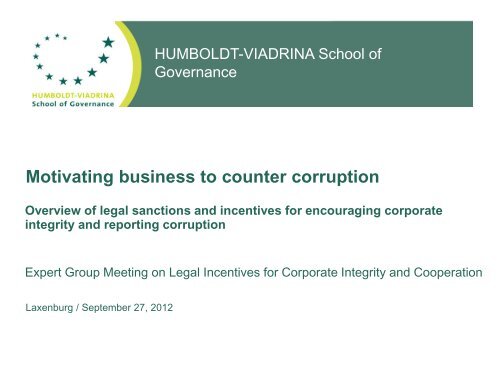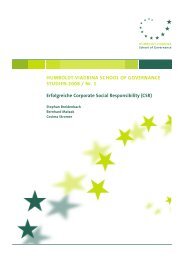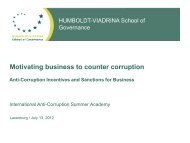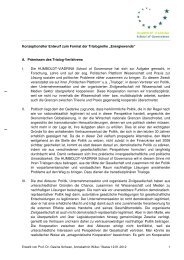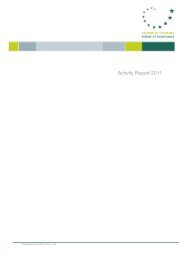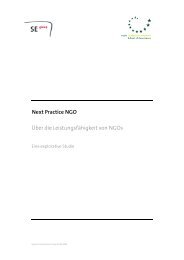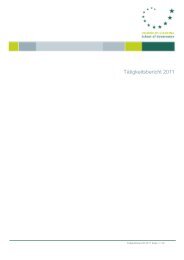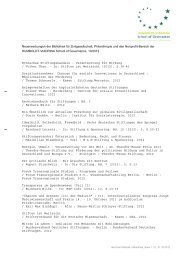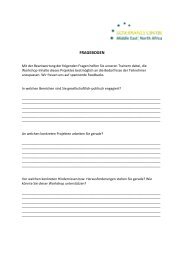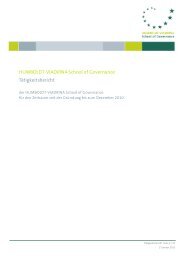here - HUMBOLDT-VIADRINA School of Governance
here - HUMBOLDT-VIADRINA School of Governance
here - HUMBOLDT-VIADRINA School of Governance
Create successful ePaper yourself
Turn your PDF publications into a flip-book with our unique Google optimized e-Paper software.
<strong>HUMBOLDT</strong>-<strong>VIADRINA</strong> <strong>School</strong> <strong>of</strong><br />
<strong>Governance</strong><br />
Motivating business to counter corruption<br />
Overview <strong>of</strong> legal sanctions and incentives for encouraging corporate<br />
integrity and reporting corruption<br />
Expert Group Meeting on Legal Incentives for Corporate Integrity and Cooperation<br />
Laxenburg / September 27, 2012
About the initiative ‘Anti-Corruption Incentives and<br />
Sanctions for Business’<br />
This initiative aims to<br />
• provide interested parties from the Public Sector, Business Sector, and Civil<br />
Society, with an overview <strong>of</strong> existing and potential sanctions and incentives to<br />
motivate business to counter corruption,<br />
• discuss their applicability in selected partner countries, and<br />
• promote behavioral change.<br />
Duration: January 1, 2011 – December 31, 2013<br />
Steering Committee:<br />
Supporter:<br />
Dr. Valerie Federico-Weinzierl, Pr<strong>of</strong>. Dr. Gesine Schwan,<br />
Jermyn Brooks, Pr<strong>of</strong>. Dr. Peter Eigen<br />
Siemens as part <strong>of</strong> the Siemens Integrity Initiative<br />
http://www.humboldt-viadrina.org/anti-corruption/<br />
2
Roles <strong>of</strong> different stakeholders<br />
Businesses act in complex environments with a variety <strong>of</strong> different stakeholders, such as<br />
public procurement agencies, business suppliers, civil society organizations, media, etc.<br />
Stakeholders<br />
Incentives<br />
Sanctions<br />
Business<br />
Public<br />
Sector<br />
Business<br />
Sector<br />
Civil<br />
Society<br />
• Governmental Institutions<br />
• Intergovernmental<br />
Organizations, etc.<br />
• Business<br />
• Business Associations, etc.<br />
• Civil Society Organizations<br />
• Media<br />
• Academia, etc.<br />
Debarment<br />
Confiscation<br />
Termination <strong>of</strong> contract<br />
Preferred supplier status<br />
Increased risk premium<br />
Examples<br />
Public naming & shaming<br />
Reduced sanctions<br />
Fines<br />
Public award<br />
Imprisonment<br />
Lower tax rates<br />
Business<br />
Company<br />
as a whole<br />
Company‘s<br />
Representatives<br />
3
Anti-corruption sanctions and incentives<br />
Punishments for<br />
violating your<br />
anti-corruption<br />
standards<br />
Commit or attempt corrupt act<br />
Lack <strong>of</strong> commitment to good<br />
practice anti-corruption standard<br />
Anti-Corruption<br />
SANCTIONS<br />
for Business<br />
Rewards for<br />
meeting or<br />
exceeding your<br />
anti-corruption<br />
standards<br />
Refrain from corrupt act<br />
Demonstrate commitment to good<br />
practice anti-corruption standard<br />
Anti-Corruption<br />
INCENTIVES<br />
for Business<br />
While not all businesses need specific motivations to ad<strong>here</strong> to anti-corruption<br />
standards, sanctions and incentives are key measures to counter corruption.<br />
4
A combined approach<br />
Purpose:<br />
Provide sanctions to punish violations<br />
<strong>of</strong> your anti-corruption standards<br />
Purpose:<br />
Provide incentives to reward meeting<br />
or exceeding your anti-corruption<br />
standards<br />
But, only sanctions …<br />
• will likely lead to limited or no self-disclosure<br />
(reporting) <strong>of</strong> corrupt practices<br />
• do not provide motivation for companies to<br />
cooperate (i.e. don’t signal trust to companies)<br />
But, only incentives …<br />
• do not punish non-compliance (i.e. companies<br />
may consciously and openly operate in violation<br />
<strong>of</strong> the standards)<br />
• can lead to free-riding and window dressing<br />
• could lead companies to ad<strong>here</strong> to your standard,<br />
but they seldom provide motivation to go<br />
further, etc.<br />
• can create dependencies for a company, etc.<br />
Provide sanctions and <strong>of</strong>fer incentives to mitigate the threatened sanctions to<br />
encourage reporting, cooperation and rehabilitation <strong>of</strong> companies<br />
5
2 major contexts to apply mitigation incentives<br />
• T<strong>here</strong> are two main contexts in which mitigation incentives can be applied:<br />
Mitigation incentives<br />
Context 1:<br />
Before violation <strong>of</strong> anti-corruption<br />
standard is known to stakeholder<br />
e.g.: company self-discloses violation <strong>of</strong> anticorruption<br />
standards (reporting) to<br />
stakeholder<br />
Context 2:<br />
After violation <strong>of</strong> anti-corruption<br />
standard is known to stakeholder<br />
e.g.: company cooperates and enhances its<br />
internal anti-corruption system<br />
‣ Detects otherwise undiscovered corrupt<br />
behavior<br />
‣ Prevents from driving problems under<br />
ground (i.e. break pact-<strong>of</strong>-silence)<br />
‣ Offers ways back to legality, etc<br />
‣ Motivate companies to enhance their<br />
internal anti-corruption systems<br />
‣ Motivate business proactive engagement<br />
with stakeholder<br />
‣ Recognize existence <strong>of</strong> ‘rogue<br />
employees’ , etc<br />
*Mitigation incentives are no ordinary incentives as they require a (threatened) sanction which can be reduced by the company through mitigating factors<br />
6
Example for context 1<br />
• US Sentencing Guidelines acknowledge self-reporting by companies in the calculation <strong>of</strong> the culpability score<br />
(example: Pride International received 55% reduction <strong>of</strong> fine due to self reporting and cooperation)<br />
Sources: http://www.ussc.gov/Guidelines/2011_guidelines/Manual_HTML/Chapter_8.htm and http://www.justice.gov/criminal/fraud/fcpa/cases/pride-intl.html<br />
7
Example for context 2<br />
• US Sentencing Guidelines’ conditions for probation for organization allows to require a supervised<br />
establishment/enhancement <strong>of</strong> an internal compliance program (example: Kellogg Brown & Root LLC agreed<br />
in 2009 to retain an external compliance monitor in plea agreement for organizational probation)<br />
Sources: http://www.ussc.gov/Guidelines/2010_guidelines/Manual_HTML/8d1_4.htm and http://www.justice.gov/criminal/fraud/fcpa/cases/kelloggb/02-11-<br />
09kbr-plea-agree.pdf<br />
8
Categorizing anti-corruption sanctions and incentives<br />
• Public prosecution <strong>of</strong>fices, procurement <strong>of</strong>fices and state-owned enterprises can reduce legal,<br />
commercial & operational and reputational sanctions in return for reporting, cooperation and<br />
rehabilitation<br />
Legal<br />
Commercial &<br />
operational<br />
Reputational<br />
Anti-Corruption<br />
SANCTIONS<br />
for business<br />
• Fine<br />
• Compensation for damages<br />
• Confiscation <strong>of</strong> proceeds <strong>of</strong><br />
corruption<br />
• Imprisonment (only business<br />
representatives)<br />
• Termination <strong>of</strong> relationship<br />
• Exclusion from opportunities<br />
• Assignment <strong>of</strong> unfavorable<br />
conditions<br />
• Punishment through casespecific<br />
publication<br />
• Punishment through<br />
analysis <strong>of</strong> comparative<br />
performance<br />
Anti-Corruption<br />
INCENTIVES<br />
for business<br />
• Reduced legal sanction*<br />
• Access to opportunities<br />
• Assignment <strong>of</strong> preferential<br />
conditions<br />
• Reduced commercial &<br />
operational sanction*<br />
• Reward through casespecific<br />
publication<br />
• Reward through analysis <strong>of</strong><br />
comparative performance<br />
• Reduced reputational<br />
sanction*<br />
*Mitigation incentive; Categorization based on <strong>HUMBOLDT</strong>-<strong>VIADRINA</strong>‘s initiative „Anti-corruption incentives and sanctions for business“<br />
9
7 key principles for implementing and/or benchmarking<br />
anti-corruption sanctions and incentives<br />
ESTABLISHING<br />
1<br />
2<br />
3<br />
IMPACT: Be relevant and proportionate!<br />
COMMUNICATION: If nobody knows, nobody cares!<br />
MONITORING: Trust is good, monitoring is necessary!<br />
EVALUATING<br />
ENHANCING<br />
7<br />
EVALUATION: Are your measures working?<br />
4<br />
MULTIPLICATION: The more, the merrier!<br />
5<br />
RESPONSIBILITY: Extend who‘s accountable!<br />
6<br />
MITIGATION: Apply incentives for rehabilitation!<br />
10
Findings from a global expert survey on anti-corruption<br />
incentives and sanctions*<br />
Ranking <strong>of</strong> sanctions and incentives<br />
Other related findings<br />
• 85% considered Governmental<br />
Institutions as very important stakeholder<br />
in setting incentives and sanctions for<br />
businesses<br />
• 70% <strong>of</strong> respondents agreed that the<br />
increase use <strong>of</strong> approaches for<br />
streamlining prosecution encourages<br />
self-reporting<br />
• 58% <strong>of</strong> respondents agreed that mitigation<br />
factors should be used less frequently<br />
as they reduce the initial deterrent effect <strong>of</strong><br />
a sanction<br />
* <strong>HUMBOLDT</strong>-<strong>VIADRINA</strong> <strong>School</strong> <strong>of</strong> <strong>Governance</strong> (2012). Motivating Business to Counter Corruption – A Global Survey on Anti-Corruption Incentives and<br />
Sanctions. (see www.humbold-viadrina.org/anti-corruption)<br />
11
Key facts on anti-corruption mitigation incentives to<br />
encourage reporting, cooperation and rehabilitation<br />
S<br />
… provide sanctions and <strong>of</strong>fer incentives to mitigate the threatened sanctions to<br />
encourage reporting, cooperation and rehabilitation <strong>of</strong> companies<br />
… mitigation incentives can be <strong>of</strong>fered before and after violation <strong>of</strong> anti-corruption<br />
standards is known (e.g. disclosure programs, settlements)<br />
… consider legal, commercial & operational, and reputational sanctions and related<br />
mitigation incentives when evaluating their best course <strong>of</strong> action<br />
… consider 7 key principles for implementing and/or benchmarking anti-corruption<br />
sanctions and mitigation incentives to encourage reporting, cooperation and<br />
rehabilitation <strong>of</strong> companies<br />
12
Questions?<br />
13
Thank You for your attention.<br />
The <strong>HUMBOLDT</strong>-<strong>VIADRINA</strong> <strong>School</strong> <strong>of</strong> <strong>Governance</strong> in Berlin/Germany was founded in 2009 by the Humboldt-<br />
Universität zu Berlin and the European University Viadrina in Frankfurt (Oder) to bring together the public<br />
and private sectors, civil society, academia, and the media. Its aim is to find practical solutions for social<br />
challenges and to contribute to sustainable democratic politics by building political consensus through<br />
multi-stakeholder cooperation. The <strong>School</strong> has a special character: it seeks to be an academically respected<br />
institution, as well as an active civil society organization that encourages public debates and long-term<br />
policy projects.<br />
The <strong>School</strong> is advised by respectable global governance practitioners, including Peter Eigen, Pascal Lamy,<br />
Joseph Nye, Mary Robinson, Richard von Weizsäcker, and Festus Gontebanye Mogae.<br />
http://www.humboldt-viadrina.org/anti-corruption/<br />
sebastian.wegner@humboldt-viadrina.org<br />
14
Appendix<br />
15
Towards a list <strong>of</strong> incentives and sanctions by the public<br />
sector to encourage reporting, cooperation and<br />
corporate integrity<br />
Reduce fines for self-reporting<br />
Reduce fines for voluntary corrective actions (e.g.<br />
payment <strong>of</strong> damages, proceeds <strong>of</strong> corruption)<br />
Reduce/refrain from fine in case <strong>of</strong> existence <strong>of</strong> an<br />
anti-corruption system and for its enhancement<br />
Offer shares <strong>of</strong> sanctions to whistleblowers which<br />
provided key information<br />
Refrain from exclusion from public funds in case <strong>of</strong><br />
self-reporting and existence <strong>of</strong> anti-corruption systems<br />
Terminate exclusion from public contracts if<br />
company established anti-corruption system<br />
Reduce prison sentence or refrain from<br />
imprisonment in case <strong>of</strong> self-reporting<br />
Refrain from termination <strong>of</strong> contracts in case <strong>of</strong> selfreporting<br />
and existence <strong>of</strong> anti-corruption systems<br />
Reduce sanctions for cooperation with investigation<br />
Refrain from making corruption public in case <strong>of</strong><br />
self-reporting<br />
Make existence <strong>of</strong> effective anti-corruption systems<br />
mandatory to receive public funds<br />
…<br />
Measures require e.g. law enforcement, resources and elaborated legal procedures such as voluntary<br />
disclosure programs, settlements and other agreements between companies and the authorities.<br />
16


